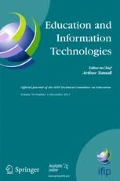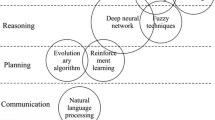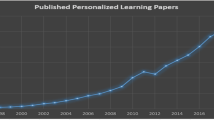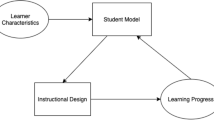Abstract
Traditional e-Learning environments are based on static contents considering that all learners are similar, so they are not able to respond to each learner’s needs. These systems are less adaptive and once a system that supports a particular strategy has been designed and implemented, it is less likely to change according to student’s interactions and preferences. New educational systems should appear to ensure the personalization of learning contents. This work aims to develop a new personalization approach that provides to students the best learning materials according to their preferences, interests, background knowledge, and their memory capacity to store information. A new recommendation approach based on collaborative and content-based filtering is presented: NPR_eL (New multi-Personalized Recommender for e Learning). This approach was integrated in a learning environment in order to deliver personalized learning material. We demonstrate the effectiveness of our approach through the design, implementation, analysis and evaluation of a personal learning environment.
















Similar content being viewed by others
References
Anandakumar, K., Rathipriya, K., & Dr Bharathi, A. (2014). A survey on methodologies for personalized e-Learning recommender systems. International Journal of Innovative Research in Computer and Communication Engineering, 2(6).
Anjorin, M., Rensing, C., & Steinmetz, R. (2011).Towards ranking in folksonomies for personalized recommender systems in e-Learning. http://www.crokodil.de, http://demo.crokodil.de.
Benhamdi, S., & Seridi, H. (2011).Pedagogical content personalization. In the Proceeding of ITHET’11 Conference (vol. 10), Turkey.
Bobadilla, J., Seradella, F., & Hernando, A. (2009). Collaborative filtering adapted to recommender systems of e-Learning. Knowledge-Based Systems, 22, 261–265.
Botvinick, M., et al. (2003). Constructive processes in immediate serial recall: A recurrent network model of the bigram frequency effect. In B. Kokinov & W. Hirst (Eds.), Constructive memory (pp. 129–137). Sofia: New Bulgarian University.
Burke, R. (2002). Hybrid recommender systems: survey and experiments. User Modeling and User-Adapted Interaction, 12(4), 331–370.
Downes, S. (2010). New technology supporting informal learning. Journal of Emerging Technologies in Web Intelligence, 2(1), 27–33.
Drachsler, R. et al. (2009). ReMashed - an usability study of a recommender system for mash-ups for learning. 1st Workshop on Mashups for Learning at the International Conference on Interactive Computer Aided Learning, Villach, Austria.
Durao, F., & Dolog, P. (2010). Extending a hybrid tag-based recommender system with personalization. In Proceedings 2010 ACM Symposium on Applied Computing, SAC 2010, Sierre, Switzerland (pp. 1723–1727).
Ferraris, C., Lejeune, A., Vignollet, L. & David, J.-P. (2005). Modélisation de scénarios d’apprentissage collaboratif. Université de savoie, EIAH’2005 (Environnements Informatiques pour l’Apprentissage Humain), Montpellier, 2005 (pp. 285–296).
Giacomini, E. P., Trigano, P., & Alupoaie, S. (2006). Knowledge base for automatic generation of online IMS LD compliant course structures. Educational Technology & Society, 9(1), 158–175.
Herloker, J. L., Konston, J. A., Terveen, L. G., & Riedl, J. (2004). Evaluating collaborative filtering recommender systems. ACM Transactions on Information Systems, 22, 5–53.
Kim, B.M., & Li, Q. (2004). Probabilistic model estimation for collaborative filtering based on items attributes. In Proceedings of the IEEE/WIC/ACM International Conference on Web Intelligence (WI’04), Beijing, China (pp. 185–191).
Kirshenman, U. et al. (2010). The demands of modern PLEs and the ROLE approach. In M. Wolpers et al. (Eds.), EC-TEL 2010, LNCS (6383, pp. 167–182).
Koshmann, T. (1996). CSCL: Theory and practice of an emerging paradigm. Mahwah, NJ: Lawrence Erlbaum Associates.
Lichtnow, D., et al. (2011). Recommendation of learning material through students’ collaboration and user modeling in an adaptive e-Learning environment. Technology enhanced systems and tools, SCI, 350, 258–278.
Manouselis, N., Drachsler, H., Verbert, K., & Santos, O. C. (2010). Proceedings of the 1st workshop on recommender systems for technology enhanced learning (RecSysTEL). Procedia Computer Science, 1(2), 2773–2998.
Mödritscher, F. (2010). Towards a recommender strategy for personal learning environments. Procedia Computer Science, 1(2), 2775–2782.
Oxford, R. (2001). Language learning styles and strategies. In M. Celce- Murcia (Ed.), Teaching English as a second or foreign language (3rd ed.). Boston: Heinle & Heinle.
Rawlings, A., van Rosmalen, P., Koper, R., Rodriguez-Artacho, M., & Lefrere, P. (2002). Survey of educational modelling languages (emls). Technical report,
Salehi, M., Kamalabadi, I. N., & Ghoushchi, M. B. G. (2014). Personalized recommendation of Learning material using sequential pattern mining and attribute based collaborative filtering. Education and Information Technologies, 19, 713–735.
Santos, O. C., & Boticario, J. G. (2011). Educational recommender systems and technologies: Practices and challenges. Hershey: IGI Global.
Taraghi, B., Ebner, M., Till, G., & M¨uhlburger, M. (2009). personal learning environment – a conceptual study. In International Conference on Interactive Computer Aided Learning (pp. 25–30).
Tuomi, I. (2005). The future of learning in the knowledge society: Disruptive changes for Europe by 2020. In Y. Punie & M. Cabrera (Eds.), The future of ICT and learning in the knowledge society: Report on a joint DG JRC–DG EAC workshop held in Seville, 20–21 October (pp. 47–85). European Commission: Luxembourg.
Van Harmelen, H. (2001). Design trajectories: four experiments in PLE implementation, Interactive Learning Environments, 1744–5191, 16(1), 2008, 35–46.
Van Meteren, R., & Van Someren, M. (2000). Using content-based filtering for recommendation. In: Proceedings of MLnet/ECML2000 Workshop, Barcelona, Spain.
Vladoiu, M., Constantinescu, Z., & Moise G. (2013). QORECT – a case-based framework for quality-based recommending open courseware and open educational resources In C. Bădică, N.T. Nguyen, & M. Brezovan (Eds.), ICCCI 2013, LNAI 8083, 681–690.
Weng, L. T., Xu, Y., Li, Y., & Nayak, R. (2008). Exploiting item taxonomy for solving cold-start problem in recommendation making. ICTAI (2), 113–120.
Wilson, S., Liber, P. O., Johnson, M., Beauvoir, P., & Sharples, P. (2007). Personal learning environments: challenging the dominant design of educational systems. Journal of e-Learning and Knowledge Society, 3(2), 27–28.
Ziegler, C.-N., Lausen, G., & Schmidt-Thieme, L. (2004). Taxonomy -driven computation of product recommendations. In Proceedings of the 2004 ACM CIKM Conference on Information and Knowledge Management Washington, D.C., USA, ACM Press, 406–415.
Author information
Authors and Affiliations
Corresponding author
Rights and permissions
About this article
Cite this article
Benhamdi, S., Babouri, A. & Chiky, R. Personalized recommender system for e-Learning environment. Educ Inf Technol 22, 1455–1477 (2017). https://doi.org/10.1007/s10639-016-9504-y
Published:
Issue Date:
DOI: https://doi.org/10.1007/s10639-016-9504-y




